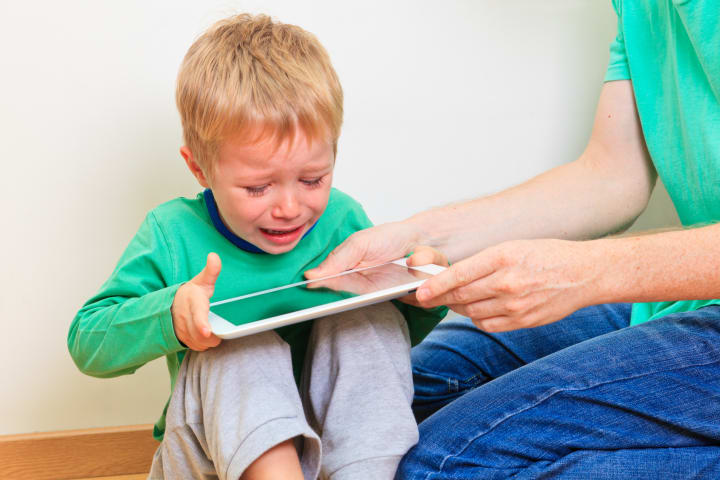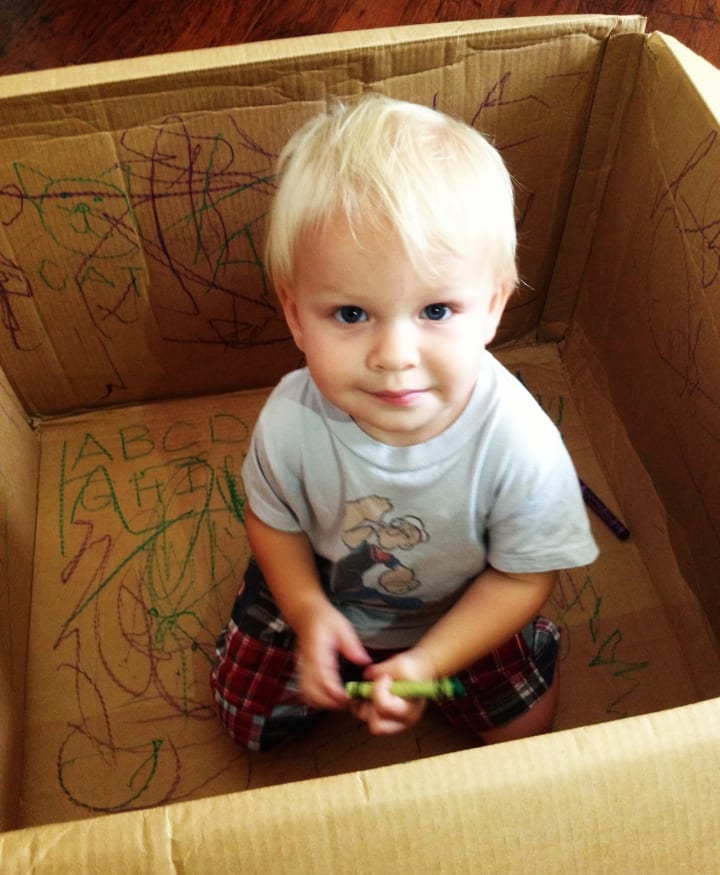How To Survive the Terrible Twos
Yes, they're loud and destructive — but your toddlers will get better. Here's how to survive the terrible twos while keeping your sanity in tact.

Ever since you got pregnant, you probably have heard women warn you to brace yourself for certain stages of your child's life. Newborn babies, for example, are known to drain you of sleep and patience with incessant crying. But, as bad as newborns can be, most moms will take a newborn over a child who is entering the Terrible Twos.
Something about being a two-year-old makes kids go nuts. They're running, walking, and curious about everything. They can talk, and they're also discovering their voices for the first time, too.
So, basically, this is a stage of your child's life where noise will be an all-time high, accidents will happen, and of course, tantrums will become the norm. It's enough to make you go a little crazy. As bad as it can be, it is survivable.
Moms who have been through it can tell you that it's crucial to learn how to survive the Terrible Twos before you get to that stage. Here are some of their best tips...
Plan around your kid's napping and food times.

During the Terrible Twos, tantrums are the name of the game. Kids who are cranky are way, way more likely to explode if they aren't well-rested and well-fed. After all, the same can be said about adults as well.
So, do what you can to make nap time and food times as routine as possible — and plan outings around the times that your kiddo will be sleeping and eating. With a rested and satiated child, you will have fewer tantrums and more awesome memories.
Though you should try to clear tantrum triggers out of the way, you shouldn't cave in to your child's demands.

Learning how to survive the Terrible Twos often relies on learning how to deal with tantrums, and how to curb them. After all, this is peak tantrum season.
There's a distinct difference between putting temptations in your kid's way and just being firm. If you notice your kid tends to have tantrums when they can't get a toy at the toy store, don't bring them to the toy store unless they are getting a toy.
When you are sleep-deprived and just want a moment of quiet, you will want to cave into your child's demands. Don't! This is how you end up raising a tiny tyrant who tantrums every single time they don't get what they want.
Instead, it's better to stay firm or even lessen what they were going to originally get. This way, kids learn rather quickly that throwing a hissy fit will not get them anywhere — and may actually hurt their chances at getting what they want.
If your child begins to throw a tantrum in public, calmly scoop them up and get them out of there until they settle down.

This does three things: it teaches your child that throwing tantrums isn't good, reduces the noise volume for others around you, and also ensures that people around you won't get miffed.
Believe it or not, toddlers pick up on the fact that being taken away from others around them is a form of punishment. So, they will be less likely to tantrum if they regularly see that you don't want them around others when they do it.
Another aspect of learning how to survive the Terrible Twos is learning how to talk things out with your kid.

Talking is important — very important, actually.
A large portion of temper tantrums involves frustration because kids don't have the vocabulary or physical ability to do what they want to do. So, talk to your kid if you notice that they are feeling frustrated or are trying to communicate something.
Ask them if they feel frustrated (then explain what that means), or if they feel sad. Acknowledge when they feel sad or mad. More often than not, this allows them to learn how to process feelings in a healthy manner and also aids in teaching them the right words to use.
Similarly, explaining why things happen can help them learn what to avoid when it comes to behavior. For example, telling your toddler that they didn't get a chocolate because they threw a tantrum may make them realize there are consequences to crying.
Make a point of showing consequences and rewards.

When it comes to learning how to survive the Terrible Twos, learning how to be consistent in your message is often key.
Kids react well when they are told they will get a reward if they behave well. Similarly, kids will also avoid bad behavior if they are told that punishment will occur if they don't behave well.
However, saying without delivering will only cause all those words to end up being ignored. In order to make sure your kids get the point, show them that there are consequences to all of their actions — good or bad.
Then, to ensure they understand why this is happening, explain to them, once more, why this is all happening. So, after they get a time out, explain to them that it was because they threw a tantrum and broke a vase. After they get a chocolate reward, tell them it's because they completed potty training.
Encourage independence — big time!

Believe it or not, giving your kids space is a great way to encourage independence. Positive reinforcement is great for this, and also can make them feel better about growing up to be a big kid.
Celebrate when your toddler starts feeding themselves, and congratulate them when they learn to flush the toilet on their own. Give your child time on their own in the play room, too; they don't need a helicopter parent around them 24/7 anymore.
An independent toddler is a more manageable toddler. Additionally, independence also can help make your toddler feel more confident, more respected, and more empowered as a child.
Obviously, not every parent looking for answers about how to survive the Terrible Twos will want to hear this. A lot of parents really do get hooked on being with their kids 24/7, so being told to cut back on that isn't always fun to hear.
Getting that space and feeling like your kid doesn't need you as much can be very jarring for a parent who's used to doing every little thing for their kid. It may make you feel like a bad mom. However, it's in your child's best interest to give them space to develop — and you have to remember that.
It's okay to ask for a time out.

Part of learning how to survive the Terrible Twos is learning how to cope with the stress of parenting toddlers. We all know that it's stressful. In fact, there probably isn't a mom alive who hasn't broken down in tears because she's so overwhelmed with the demands of their pint-sized people.
As a parent, you legitimately cannot lose your temper on your toddler. Losing your cool and ending with a screaming match will cause your kids to get frightened — and also will probably cause serious behavioral problems.
If you notice that you're really not feeling good about your moods, it's okay to put your toddler in their room, walk out of the house, and not talk to your children for a couple of minutes. Doing this will not hurt your toddler.
If you're really, truly overwhelmed, it's absolutely acceptable and fine to call up a relative or get a sitter who can mind your toddler for a day while you collect yourself.
When learning how to survive the Terrible Twos as a special needs parent, respite care may be something you want to look into.

As bad as the Terrible Twos can be with normal, healthy toddlers, it's often ten times worse for parents of toddlers with special needs. In the case of special needs toddlers, you might need to consider applying for respite care via a government agency.
Believe it or not, getting time away from your special needs child is possible — and it also can help you survive the Terrible Twos with your sanity intact. Searching up respite care online can give you great resources, as well as a good guide on how to set it up.
The best part about respite care is that it's often free of charge, which means that cash-strapped parents don't need to feel left out.
Lastly, remember that the Terrible Twos is just a phase.

All the guides in the world can tell you how to survive the Terrible Twos in decent shape, but let's just be real, it will be hard regardless of what resources you have. The good news is that this time in your kids' lives will be over soon enough — often within a year.
So, cheer up, buttercups. It gets better in time.
About the Creator
Rowan Marley
Rowan Marley is a 20-year-old sports enthusiast who hails from Brooklyn. When he's not hitting up a local Zumba class, he's drinking organic smoothies. That's just how he rolls.






Comments
There are no comments for this story
Be the first to respond and start the conversation.